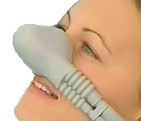Nitrous oxide Risks
 Most of the risks associated with the use of nitrous oxide by dental patients are caused either by problems or errors in the proper administration of the gas (e.g. errors in the mixture of N2O/O2) or by the inappropriate use of nitrous oxide to patients with conditions that contradict its usage.
Most of the risks associated with the use of nitrous oxide by dental patients are caused either by problems or errors in the proper administration of the gas (e.g. errors in the mixture of N2O/O2) or by the inappropriate use of nitrous oxide to patients with conditions that contradict its usage.
Pressure increase due to nitrous oxide
A major cause of risks related to nitrous oxide is the change of pressure/volume of air-filled cavities in the body. Nitrous oxide is 34 times more soluble in blood than the nitrogen that is replaced. It will thus diffuse from the blood into any closed air-containing space in the body faster than the nitrogen can diffuse out. This causes a temporary increase of the volume of the gas filling the cavity, and subsequently an increase in the pressure to the walls of the cavity. Although the effect can be short lived, it can be enough to cause significant pain or/and damage to the affected body tissues.
Eye damage - The increase on air pressure does not affect only physical body cavities, but also any enclosed air filled area in the body. Nitrous oxide should not be administered to patients who recently had ocular eye surgery. Opthalmologists frequently inject intraocular gases during eye surgeries related to retinal detachments (pneumatic retinopexy). These gas bubbles can remain in the eyeball up to 3 months before they are reabsorbed. Nitrous oxide inhalation can result in the immediate expansion of the gas bubble in the eye causing healing complications and possibly eye damage. Cases of total vision loss due to central retinal artery occlusion have been reported in patients who had a recent pneumatic retinopexy eye surgery followed by dental treatment using nitrous oxide sedation.
Ear problems - Nitrous oxide sedation can create an elevated pressure in the middle ear. This may result in ear problems like a sharp pain for a small percentage of patients, and in extreme cases bleeding in the ear, hearing impairment or rupture of typanic membrane. For this reason, patients who recently had any kind of middle ear surgery (e.g. tympanic membrane graft) or have blocked eustachian tubes should not be treated with inhalation sedation because the tympanic membrane can become distended and damaged following inhalation of the nitrous oxide.
Gut pain - Nitrous oxide will dissolve out of blood into air filled spaces such as the intestines, increasing the volume of air inside them, which can lead to severe gut pain.
In order to avoid possible side effects, nitrous oxide should not be used by patients who recently had middle ear or ocular eye surgery, or have sinusitis, ear problems, bowel obstruction or pneumothorax. Patients with any of these conditions should inform their dentist, in order to suggest another more suitable method of sedation.
|
XynaMAX NO2 Nitric Oxide Booster Pills, L-Arginine Dietary Supplement Promotes Fast Muscle Building, Boost Performance, Increase Endurance & Improve Recovery - Powerful Nitric-oxide Booster Packed with Amino Acids - 100% Guaranteed Satisfaction Health and Beauty (Key Natural)
|

|
Bacharach Model 3010, Nitrous Oxide (N2O) Monitor BISS (Bacharach)
|





